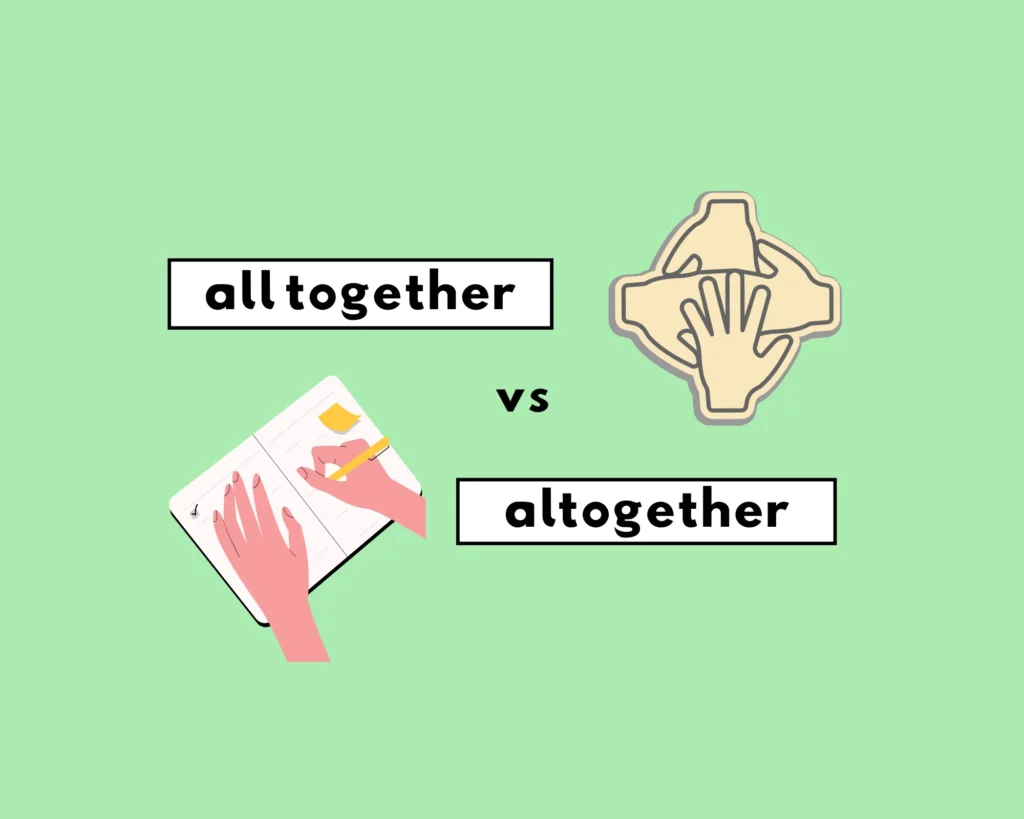“Altogether” vs. “all together”
Are altogether and all together the same word? If not, what’s the difference between them?
His story seemed altogether too far-fetched to be true.
Let’s get everyone all together for a family picture.
The children played happily altogether in the park.
The result was all together unexpected.
Though both words sound alike and are spelled similarly, they have different meanings and are not interchangeable with each other—make sure not to confuse them in writing!
When to use ‘altogether’ vs. ‘all together’
| Examples with “altogether” | Examples with “all together” |
| How much is that altogether? | Mix the ingredients all together with a spoon. |
All together (two words) means doing something literally all together, as one group, or together with everyone else: Put the rice and the vegetables in the pot and mix them all together.
Altogether (one word) is an adverb that means “completely,” “totally” or “entirely”: I stopped seeing her altogether.
There are many “all” phrases in English; “all together” being an example. Others are all along, all right or alright.
Altogether is an adverb. Sometimes altogether can be used as a transition word in sentences. In this way, it’s similar to ‘all things considered,’ or ‘all in all.’ For example, ‘Altogether, the argument does not stand in the end.’
“Altogether” / “all together”, used in sentences
| Examples: “altogether’ used in sentences |
|---|
| He had married several times and had six children altogether.Altogether, I’m glad it’s over.I’m not altogether sure that I’d trust himThe debt amounted altogether to twenty dollars.When he first saw the examination questions, he was altogether baffled.’Tis altogether vain to learn wisdom and yet live foolishly. (Dutch Proverbs) |
| Examples: “all together’ used in sentences |
|---|
| Let’s sing ‘Happy Birthday’. All together now!Place your books all together so we don’t forget them in the morning.The wedding guests were gathered all together in the garden.The girls were happy when the teacher put them all together in a group.The waiter asked if we were all together so I explained that we were two separate parties.It is difficult to get them all together under one roof. |
Synonyms of ‘altogether’
These words and phrases share a similar meaning with the phrase altogether, and are synonyms:
- on the whole
- all things considered
- en masse
- generally
- by and large
- in all
- in sum
- everything included
- collectively
- for the most part
Think of the space in “all together” (two words) as the space between individuals or items that are in a group. “Altogether” (one word) has no space, meaning it’s a single concept: completely.
Synonyms for ‘all together’
- all at once
- contemporaneously
- jointly
- simultaneously
- synchronously
- unitedly
Other commonly confused compounds
Many extremely common words that people use as compound words are often either single words, or could be a compound word (depending on the context in which it’s used.) Take a look at these other commonly confused as-a-compound words:
● Alright vs all right: Alright is a compound of all right. Technically, alright is informal and should be avoided in formal writing.
● Alot vs a lot: Alot is not a word and should be avoided period. A lot is a phrase or idiom, it means “very much” of something. It’s a flexible and versatile term that is frequently used, perhaps a little too much … or a lot.
● Nevermind vs never mind: It’s ‘never mind’ as two words. Sorry, Nirvana, but the album probably resulted in an aggregate dip in correct grammar. Hopefully the reference makes sense; If not, never mind. What started as a hunch is now confirmed, only at #Gflex. Check out this fun fact to whip out at the next social party or event: #FunFact Checked: Nirvana’s 1991 studio album “Nevermind” did indeed correlate with a noticeable increase in the one-worded version and incorrect spelling of ‘nevermind’ ! Every time vs everytime: the correct way to write every time is as two words, not one, every time.
In review: altogether/all together
The two words cannot be used interchangeably in writing (in conversation they sound the same, so it won’t matter.) In writing, the one word ‘altogether’ and two words ‘all together’ carry distinct meanings.
· Altogether means “completely,” or “entirely.”
· All together as two words means doing something as a group, or along with everyone else.
Keep reading!
| Commonly misused words | UK English vs. US English |
|---|---|
| former vs. latter | burned or burnt? |
| bear with vs. bare with | color or colour? |
| breathe or breath | favorite vs. favourite |
| compliment vs. complement | smelled or smelt? |
| effect vs. affect | gray or grey? |
| elude or allude | favor vs. favour |
| it’s or its | analyze or analyse? |
Work Sheet
Which sentence uses “altogether” correctly?
Which phrase means “completely” or “entirely”?
In the sentence “Mix the ingredients _______ with a spoon,” which phrase correctly fills the blank?
Which phrase indicates a group coming together?
Which word is an adverb?
The children played _______ in the park.
_______, the argument does not stand in the end.
How much is that _______?
The guests were gathered _______ in the garden.
I’m not _______ sure that I’d trust him.
Frequently Asked Questions
How are “altogether” and “all together” different?
+
When should I use “all together”?
+
What does “altogether” mean?
+
When should I use “altogether”?
+
Is “altogether” one or two words?
+
Yash, D. "Is Altogether One Word or Two? (Altogether or All Together?)." Grammarflex, Jun 20, 2025, https://www.grammarflex.com/altogether-vs-all-together-which-is-correct-how-to-use-both-plus-examples/.
Sources
-
Nevermind Nirvana Synonyms for altogether Commonly confused compounds Dutch Proverbs Sentence examples for all together Nordquist, Richard, “All Together vs. Altogether.” ThoughtCo, Aug. 26, 2020











